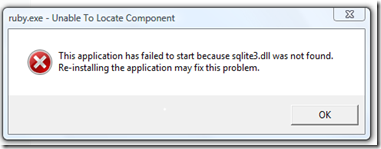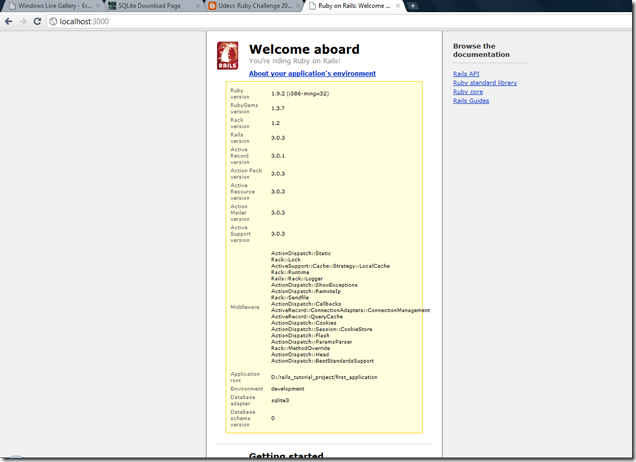Hi all one more time,
Last time we stopped by installing Rails. Let’s check one more time it’s current version
C:\Users\Monomachus>rails --version Rails 3.0.3
You can notice that from the last time we talked about it Rails version changed from 3.0.1 to 3.0.3. That’s because I’ve updated my system.
Now lets create a new application with Rails. We can do it by using “rails new name_of_the_application” command
D:\rails_tutorial_project>rails new first_application
create
create README
create Rakefile
create config.ru
create .gitignore
create Gemfile
create app
create app/controllers/application_controller.rb
create app/helpers/application_helper.rb
create app/mailers
create app/models
create app/views/layouts/application.html.erb
create config
create config/routes.rb
create config/application.rb
create config/environment.rb
create config/environments
create config/environments/development.rb
create config/environments/production.rb
create config/environments/test.rb
create config/initializers
create config/initializers/backtrace_silencers.rb
create config/initializers/inflections.rb
create config/initializers/mime_types.rb
create config/initializers/secret_token.rb
create config/initializers/session_store.rb
create config/locales
create config/locales/en.yml
create config/boot.rb
create config/database.yml
create db
create db/seeds.rb
create doc
create doc/README_FOR_APP
create lib
create lib/tasks
create lib/tasks/.gitkeep
create log
create log/server.log
create log/production.log
create log/development.log
create log/test.log
create public
create public/404.html
create public/422.html
create public/500.html
create public/favicon.ico
create public/index.html
create public/robots.txt
create public/images
create public/images/rails.png
create public/stylesheets
create public/stylesheets/.gitkeep
create public/javascripts
create public/javascripts/application.js
create public/javascripts/controls.js
create public/javascripts/dragdrop.js
create public/javascripts/effects.js
create public/javascripts/prototype.js
create public/javascripts/rails.js
create script
create script/rails
create test
create test/fixtures
create test/functional
create test/integration
create test/performance/browsing_test.rb
create test/test_helper.rb
create test/unit
create tmp
create tmp/sessions
create tmp/sockets
create tmp/cache
create tmp/pids
create vendor/plugins
create vendor/plugins/.gitkeep
Will get to each of those files in this series posts, this is what I hope at least to achieve.
Tip of the day: .gitignore file is used to let git know what kind of files we don’t want to add/commit to repository
Ok, so we got everything created now and rails made for us a brand new application which should already work so let’s try it with “rails server” command. First we need to cd into the new created directory.
And I got error at first
And these errors in command line
D:\rails_tutorial_project\first_application>rails server
C:/rubies/Ruby192/lib/ruby/gems/1.9.1/gems/sqlite3-ruby-1.3.2-x86-mingw32/lib/sq
lite3.rb:6:in `require': no such file to load -- sqlite3/sqlite3_native (LoadErr
or)
from C:/rubies/Ruby192/lib/ruby/gems/1.9.1/gems/sqlite3-ruby-1.3.2-x86-m
ingw32/lib/sqlite3.rb:6:in `rescue in <top (required)>'
from C:/rubies/Ruby192/lib/ruby/gems/1.9.1/gems/sqlite3-ruby-1.3.2-x86-m
ingw32/lib/sqlite3.rb:2:in `<top (required)>'
from C:/rubies/Ruby192/lib/ruby/gems/1.9.1/gems/bundler-1.0.7/lib/bundle
r/runtime.rb:64:in `require'
from C:/rubies/Ruby192/lib/ruby/gems/1.9.1/gems/bundler-1.0.7/lib/bundle
r/runtime.rb:64:in `block (2 levels) in require'
from C:/rubies/Ruby192/lib/ruby/gems/1.9.1/gems/bundler-1.0.7/lib/bundle
r/runtime.rb:62:in `each'
from C:/rubies/Ruby192/lib/ruby/gems/1.9.1/gems/bundler-1.0.7/lib/bundle
r/runtime.rb:62:in `block in require'
from C:/rubies/Ruby192/lib/ruby/gems/1.9.1/gems/bundler-1.0.7/lib/bundle
r/runtime.rb:51:in `each'
from C:/rubies/Ruby192/lib/ruby/gems/1.9.1/gems/bundler-1.0.7/lib/bundle
r/runtime.rb:51:in `require'
from C:/rubies/Ruby192/lib/ruby/gems/1.9.1/gems/bundler-1.0.7/lib/bundle
r.rb:112:in `require'
from D:/rails_tutorial_project/first_application/config/application.rb:7
:in `<top (required)>'
from C:/rubies/Ruby192/lib/ruby/gems/1.9.1/gems/railties-3.0.3/lib/rails
/commands.rb:28:in `require'
from C:/rubies/Ruby192/lib/ruby/gems/1.9.1/gems/railties-3.0.3/lib/rails
/commands.rb:28:in `block in <top (required)>'
from C:/rubies/Ruby192/lib/ruby/gems/1.9.1/gems/railties-3.0.3/lib/rails
/commands.rb:27:in `tap'
from C:/rubies/Ruby192/lib/ruby/gems/1.9.1/gems/railties-3.0.3/lib/rails
/commands.rb:27:in `<top (required)>'
from script/rails:6:in `require'
from script/rails:6:in `<main>'
After poking a little bit on forums I saw that I need to download the latest version of Sqlite dll’s and put them into my “ruby\bin” folder. Ok no problems, let’s do it. So you can download it here.
Downloaded, unziped, xcopied into ruby\bin folder. Let’s try again.
D:\rails_tutorial_project\first_application>rails server => Booting WEBrick => Rails 3.0.3 application starting in development on http://0.0.0.0:3000 => Call with -d to detach => Ctrl-C to shutdown server [2010-12-11 10:00:40] INFO WEBrick 1.3.1 [2010-12-11 10:00:40] INFO ruby 1.9.2 (2010-08-18) [i386-mingw32] [2010-12-11 10:00:44] INFO WEBrick::HTTPServer#start: pid=3560 port=3000
Ok so now that works fine.
P.S. Anyone knows how to run the server and then to detach in windows it also gives me an error in Windows when I try to use “rails server –d”
D:\rails_tutorial_project\first_application>rails server -d
=> Booting WEBrick
=> Rails 3.0.3 application starting in development on http://0.0.0.0:3000
C:/rubies/Ruby192/lib/ruby/gems/1.9.1/gems/activesupport-3.0.3/lib/active_suppor
t/core_ext/process/daemon.rb:3:in `fork': fork() function is unimplemented on th
is machine (NotImplementedError)
from C:/rubies/Ruby192/lib/ruby/gems/1.9.1/gems/activesupport-3.0.3/lib/
active_support/core_ext/process/daemon.rb:3:in `daemon'
from C:/rubies/Ruby192/lib/ruby/gems/1.9.1/gems/rack-1.2.1/lib/rack/serv
er.rb:262:in `daemonize_app'
from C:/rubies/Ruby192/lib/ruby/gems/1.9.1/gems/rack-1.2.1/lib/rack/serv
er.rb:202:in `start'
from C:/rubies/Ruby192/lib/ruby/gems/1.9.1/gems/railties-3.0.3/lib/rails
/commands/server.rb:65:in `start'
from C:/rubies/Ruby192/lib/ruby/gems/1.9.1/gems/railties-3.0.3/lib/rails
/commands.rb:30:in `block in <top (required)>'
from C:/rubies/Ruby192/lib/ruby/gems/1.9.1/gems/railties-3.0.3/lib/rails
/commands.rb:27:in `tap'
from C:/rubies/Ruby192/lib/ruby/gems/1.9.1/gems/railties-3.0.3/lib/rails
/commands.rb:27:in `<top (required)>'
from script/rails:6:in `require'
from script/rails:6:in `<main>'
WORKING WITH GIT
Ok now let’s try to work a little bit with git. I’ll be using now the “Git Bash” command line.
$ git init // initilize the repository $ git add . // adds everything to repository $ git commit -m "First commit" // make initial commit
So here everything should be clear. In git commit command –m means specifying message.
Now we can check the logs
Monomachus@MONOMACHUS-PC /d/rails_tutorial_project/first_application (master)
$ git log
commit 24d181eef79f1c6bd28898bcb0a587ff04a73dca
Author: unknown <Monomachus@.(none)>
Date: Sat Dec 11 10:12:55 2010 +0200
First commit
Now let’s see how can we checkout but first let’s delete some important file (Gemfile for example) and verify the status of git.
Monomachus@MONOMACHUS-PC /d/rails_tutorial_project/first_application (master) $ rm Gemfile* Monomachus@MONOMACHUS-PC /d/rails_tutorial_project/first_application (master) $ ls README app config.ru doc log script tmp Rakefile config db lib public test vendor Monomachus@MONOMACHUS-PC /d/rails_tutorial_project/first_application (master) $ git status # On branch master # Changed but not updated: # (use "git add/rm <file>..." to update what will be committed) # (use "git checkout -- <file>..." to discard changes in working directory) # # deleted: Gemfile # deleted: Gemfile.lock # no changes added to commit (use "git add" and/or "git commit -a") Monomachus@MONOMACHUS-PC /d/rails_tutorial_project/first_application (master) $ git checkout -f Monomachus@MONOMACHUS-PC /d/rails_tutorial_project/first_application (master) $ ls Gemfile README app config.ru doc log script tmp Gemfile.lock Rakefile config db lib public test vendor
So you can see here that using “git status” command we checked out the status of repository and with “git checkout –f” command we made a forced checkout and restored everything as it was before.
It’s all for today. Next time we’ll play a little with Github and Heroku. I hope you liked it.





